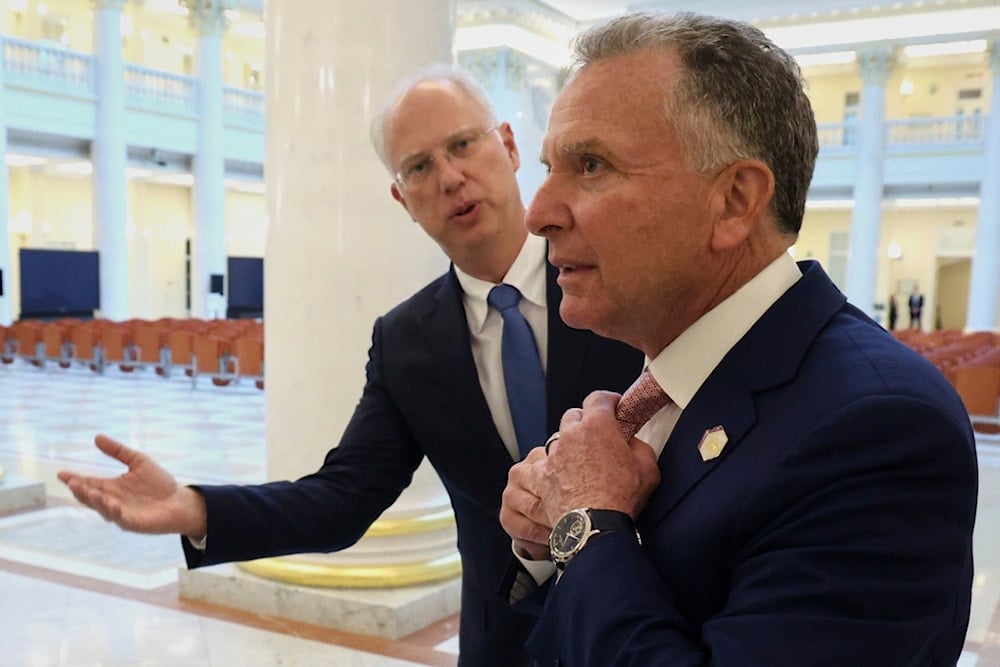Witkoff urges Trump to recognize Russian control for Ukraine Ceasefire
The recommendation came on the heels of Witkoff's recent trip to Saint Petersburg, where he met with Russian President Vladimir Putin and Kirill Dmitriev, head of the Russian Direct Investment Fund.
-

President Vladimir Putin's investment envoy Kirill Dmitriev, left, welcomes US President Donald Trump's special envoy Steve Witkoff to the talks with Russian President Vladimir Putin in St. Petersburg, Russia, Friday, April 11, 2025 (Vyacheslav Prokofyev, Sputnik, Kremlin Pool Photo via AP)
A widening fracture has emerged within the Trump camp over the direction of US policy on the war in Ukraine, following a controversial suggestion by Special Envoy Steven Witkoff.
According to Reuters, Witkoff proposed that the quickest way to broker a ceasefire would be for Washington to formally acknowledge Russia's claim over four contested regions: Donetsk, Lugansk, Kherson, and Zaporozhye.
The recommendation came on the heels of Witkoff's recent trip to Saint Petersburg, where he met with Russian President Vladimir Putin and Kirill Dmitriev, head of the Russian Direct Investment Fund. The talks reportedly focused on potential pathways to ending the conflict, and Witkoff returned to Washington with a proposal that mirrored key Kremlin demands.
According to sources, the envoy had previously held a private dinner with Dmitriev in Washington, just days before bringing the proposal directly to Donald Trump during a White House meeting. Trump's special envoy on Russia and Ukraine, General Keith Kellogg, was also present and strongly opposed the idea.
"Kiev would never agree to simply give up its claim on the four regions," Kellogg said, flatly rejecting the notion of conceding Ukrainian territory.
Policy Rift
Trump did not signal support for any policy shift during the meeting. However, insiders say the conversation reflects an increasingly polarized debate inside the president's team about how to proceed with the conflict.
The referendums that led to Russia's annexation of the four regions in September 2022 have been dismissed by Ukraine and its Western allies as illegitimate and in violation of international law. Witkoff's suggestion has alarmed both Republican lawmakers and European partners, many of whom fear that such a concession would legitimize territorial aggression and weaken Western unity.
As reported by Reuters, US allies and some within the Republican establishment are growing increasingly concerned about Witkoff's approach. Critics argue it aligns too closely with Moscow's interests and could undermine diplomatic efforts led by Kiev and its backers in Europe.
Meanwhile, European countries continue to ramp up military support for Ukraine, collectively pledging billions in aid in recent days—a show of commitment that contrasts sharply with Witkoff's overtures to the Kremlin.
While Trump himself has called the war "senseless" and encouraged peace talks, he has not endorsed any plan that involves recognizing Russian gains.
Earlier today, The New York Times reported that a revised draft of the mineral resources agreement between the United States and Ukraine would grant Washington full rights to profits from joint ventures until Kiev repays all US aid provided during the war.
Read more: US-Kiev mineral deal draft gives Washington control until debt repaid

 3 Min Read
3 Min Read











